🎤 Interview with Giichi Totsuka
2023年 12月 28日
We were delighted to be able to speak with Giichi Totsuka of the doujin circle qbert! We discussed their coverage of PC and video games from the 1990s up to now, the research and interviews that went into their Adventures in Video Game History zine series, and all the care and love that went into the development of Retro Game Aliens!
English (translated)
Translated by Renkon
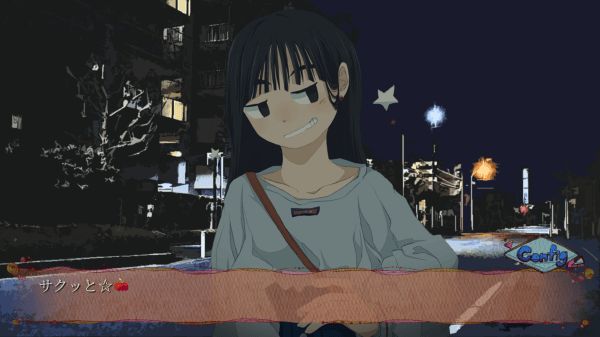
(in development) Retro Game Aliens
# Please tell us a little bit about yourself, and about your history in games journalism.
I represent the doujin game circle qbert. My main job is as a freelance writer, and I have been writing articles for Japanese computer and video game media outlets since 1990. Some of the major outlets I chiefly wrote for were MSX Magazine, BEEP! Mega Drive, Dengeki Super Famicom, Sega Saturn Magazine, TECH GIAN (adults-only magazine), Famitsu DC (Dreamcast magazine), Famitsu Xbox/Xbox 360, Weekly Famitsu, Famitsu.com, 4Gamer, and so on.
Currently, I am a reviewer for Weekly Famitsu’s New Software Cross Review. If you include my time as a cross reviewer at the sister magazine Famitsu Xbox, this year marks my twenty-first year doing this.
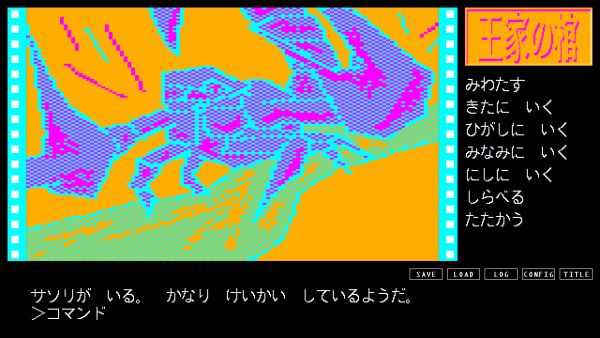
(2019) 王家の棺 (Royal Coffin)
# How did you get started making games?
I was part of the generation that was hit hard by the hobby PC boom in Japan (around '82-'83), and so in my teens, I made small- to medium-sized games in BASIC and submitted them to game programming magazines of the time. (My games appeared in several such magazines.)
After graduating from high school, I worked as a magazine writer and didn’t spend much time making games for a while. In the 2000s, through an acquaintance, I got involved in the production of several games for garakei (a common nickname for flip phones, before smart phones). I wrote the story drafts and scenarios. I enjoyed working on them, but staff were not credited for their contributions, and I didn’t like working under people telling me to do this or that, so I couldn’t make this into my regular job.
Starting with the introduction of the iPhone in 2008, there have been more and more opportunities for individuals to make their own games. I took advantage of this (laughs) and tried to find a working environment that suited me, but I would be put off by the difficulty of learning programming languages… things continued in this manner for quite a while.
In the early 2010s, several game engines were announced that specialized in the development of visual novels (or novel games) with lower hurdles to learning. One of them is TyranoBuilder. (TyranoBuilder is a tool that uses TyranoScript, which was developed by Japanese engineers, and allows you to control the functions and environments of the game production using a GUI. The first version was announced in 2013.) With TyranoBuilder, it looked like even someone like me who is not good at programming could make multi-platform games… and that conviction is what led me to where I am today.
The reason why I want to create visual novels is because through my involvement with the adult video game magazine in the latter half of the 1990s, I came into contact with many wonderful visual novels. While the gaming scene at large was caught up with 3D graphics becoming the norm, I watched from the sidelines and was convinced, “Even if the game system is old and out of date, if the games’ story, music, and visuals are wonderful, there is still plenty of value in playing them.” … of course, I was also working out how I could probably make such games of my own.
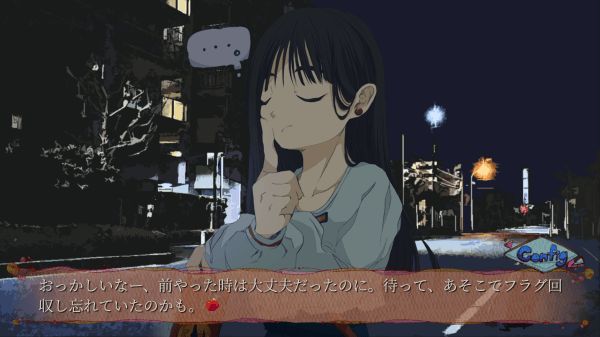
# Can you tell us about some of your favorite games and genres?
The tenets of my current game production is heavily influenced by 終わる世界とバースデイ (Owaru Sekai to Birthday), an adult game released in 2012. At the time, people in occult and spiritual circles were agitated about the end of the Mayan calendar, and here I was playing this game with its theme of “ascension,” so I was prepared for anything. When I later interviewed the creator, he said he hadn’t thought about “ascension” being a theme in the game whatsoever. (laughs)
As for recent games, I am strongly attached to indie games that incorporate meta perspectives into the game system, such as Gnosia, 198X, Paradise Killer, and Arcade Paradise.
I used to like Nobunaga’s Ambition: Zenkokuban, Columns, and Road Rash, and I played them all the time. Although these are all different genres, they all create “a phenomenon where a chain of coincidences leads to a strong one-off ‘sparkling moment,’” an experience that was the precursor to open-world games. For a long time I have been saying that “the direct ancestor of GTA is Road Rash,” but so far have not found many people who agree with me.
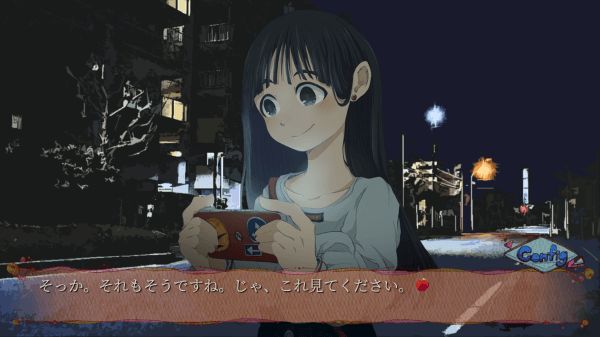
# Please tell us about Retro Game Aliens!
In the middle of the night, a middle-aged man worried about his health wanders the neighborhood streets at night without realizing what he’s doing. He encounters a mysterious woman in a residential area, and she asks him to play a retro adventure game right there on the spot… that is to say, this is a visual novel set in modern-day Japan.
The player can choose among three adventure games (installed on the woman’s portable game system… that’s the setup) in any order they want. As players progress through the games, the fantastical story deepens. You can enjoy the narrative as present and past memories intertwine.
# You collected together three different types of games and combined them into Retro Game Aliens. Can you tell us how you came up with that?
Regarding the title, there is a strong sense of word play. Much like the famous Japanese game 平安京エイリアン (Heiankyo Alien), my idea was to line up many words in an unsettling way, and convey that sense of discomfort. I have a lot of sympathy for the recently released The Cosmic Wheel Sisterhood.
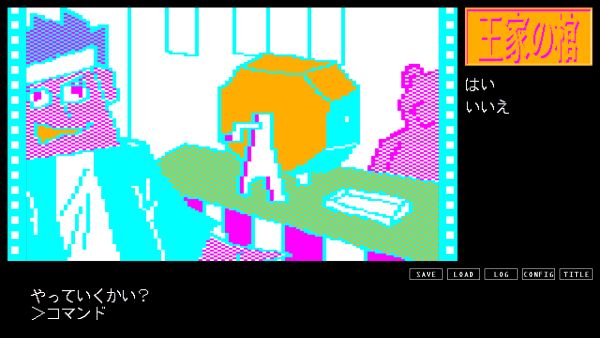
# Can you tell us about the process of making Retro Game Aliens? Was it different from the way you approached making your other games?
I first got the idea for the main story from a certain personal experience. We thought in order to bring it closer to the player’s own perspective, the best way to express it would be through multiple playable games-in-game.
Next, I considered things such as, “Can I manage the data of multiple games within the flow of the main story using my production environment (TyranoScript) and programming skills?” At the same time, we kept asking, “If we’re creating a game for modern (2018) audiences, it needs to be structured with multilingual support in mind. Is that possible?” If only I could have used Unity from the beginning… if only I could have asked someone else to do the programming… these were solutions that I didn’t have at the start of production, so instead I ran a lot of simulations to figure out how to make this myself. If I were a perfectionist, this is the point when I would have crumbled.
Visual novels as a medium combines wonderful graphics and music, on top of a powerful unfolding narrative. When creating this game, I recruited artists I had learned about through previously reporting on indie game events, and who had left a deep impression on me. Regarding the artists, I want them to gain wider recognition. If Retro Game Aliens becomes an opportunity for them to do so, I will be happy as their fan.
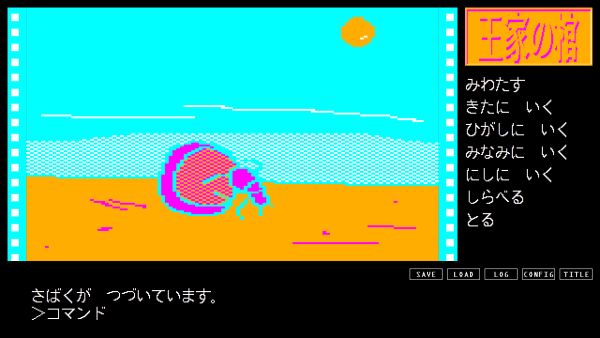
# What was your greatest influence when making Retro Game Aliens?
The word “aliens” in the title is the impression that I want you to get throughout this game. The fact that it is also the name of a song (by Japanese musicians Kirinji) about a moment when two people feel like they’re the only ones in the whole world who have been left behind… Japanese people will probably hear that and catch on.
# What was the most challenging part of making Retro Game Aliens?
It was trying to recreate a virtual game console (a handheld game system) within the world of the story. The most important point was trying to make it really feel like you’re choosing a retro game on a physical gadget. At the moment, the original version was made using TyranoScript, and with a programmer that I matched up with through my publisher, we are planning to remake it in Unity. I am sure it will feel great in the end.
# Is there anything in Retro Game Aliens to which you want to draw the player’s attention?
“No matter when the game was made, the instant they push the Start button, the player will connect to that world in real-time.” If we can get this across to players without beating them over the head with it, then I think we will have contributed to the history of video games in some way.
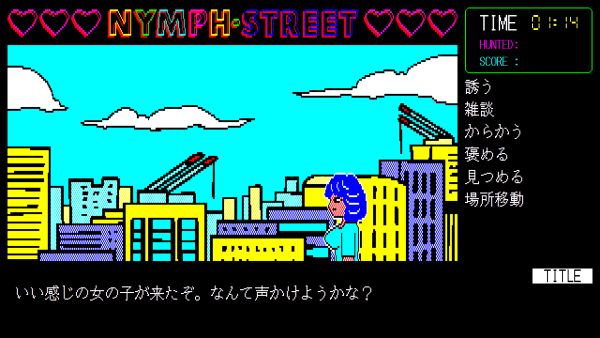
(2020) 妖精達の街路 (Nymph Street)
# The opening of the game introduces retro games to a young player. Can you tell us why you recommend these kinds of games to younger players?
I’m not trying to claim that, “Games back then were the best!”, but rather, “Depending on how you present them, there is still value in playing them now.”
The reason it’s hard for young people to get interested in older games is because they don’t feel much of a connection to them. The more older game fans talk straight-faced and passionately about the appeal of “good old games,” the more people become convinced that such games don’t have anything to do with them.
I think that even old games can be made to feel more relevant across generations by injecting episodes with little anecdotes, or presenting them in a format that is more familiar to modern audiences—give them the motivation to interact with the game and feel like, “This is relevant to me right at this moment.” I discovered this by chance due to feedback I received from a free game I created and released in 2017 (see below).
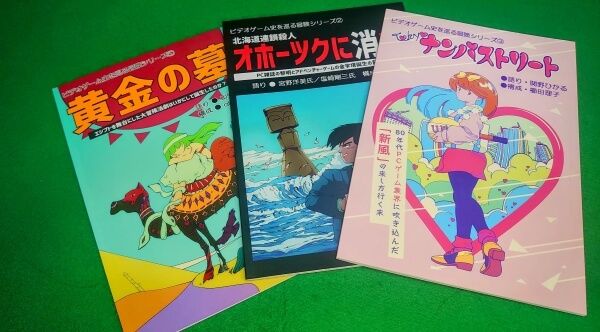
ビデオゲーム史を巡る冒険シリーズ (Adventures in Video Game History series)
# Please tell us about the zines you publish, such as the Adventures in Video Games History series.
The concept of our circle is, “The history of video games and people.” This came from my desire to preserve my own personal interests and memories related to video games, since without anyone to record them, such memories would fade away and disappear.
One way to express these memories is through zines, which have played a major role. Each book is planned and produced around a theme, with comments and recollections from people involved in every aspect of the game, from the creators to players.
Since these zines are personal projects through and through, they might be a bit lacking if used as primary texts for the histories of these video games. However, by using them as secondary texts, you can let your imagination fly as you wonder what took place between the events listed on official timelines.
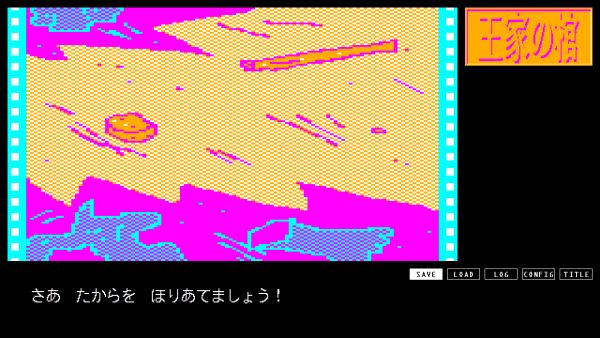
# If players overseas want to try retro Japanese adventure games, do you have any recommendations on how to get started?
I think action games for arcades, Famicom, and later home consoles are already popular all over the world. There is a huge language barrier when it comes to adventure games, so it’s not like I can recommend playing the original games that come bundled with an emulator as they are.
So to that end, you should play Retro Game Aliens since it recreates the atmosphere of games from that time and also supports multiple languages! (blatant self-appeal)
# What are some charms that retro games have and modern games lack?
These days, it’s normal to develop games across multiple platforms, but in the era of retro games (roughly the first half of the 1990s), playing the same game across consoles could have differences both subtle and dramatic. Each user felt a variety of emotions, such as being proud or stubborn, about how well “their” consoles would handle a game.
# Do you have any indie games that you’d like to shout out? What do you like about them?
It’s kind of an old game, but Expand was the first to surprise me and make me think, “Indie games can even include stuff like this.” The major publishers would never make a game like this, with its quiet and charming world.
As for recent recommendations… I’ve already mentioned some specific titles above.
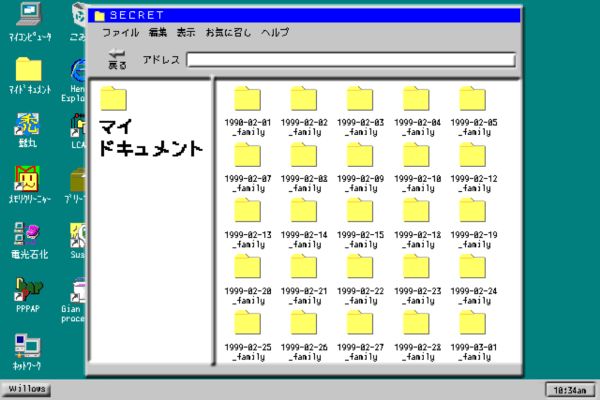
(2017) お父さんのPCクエスト (Father's PC Quest)
# Can you tell us about other games you worked on in the past?
A game about investigating the contents of your father’s PC and discovering mysterious game software… this is the situation of the free game, お父さんのPCクエスト (Father’s PC Quest), and is directly connected with my current game production. It parodies free games made in the 1990s that have since become Internet memes in Japan, and it seems to have found an audience among teens and young adults (thanks to a popular streamer playing this game…)
# Can you tell us about anything you are currently working on?
Alongside our work on Retro Game Aliens, we are currently working on an adult adventure game. We are aiming to do a straight recreation of the kind of adult games released before the 2000s that use sexual imagery as an excuse for things to go haywire.
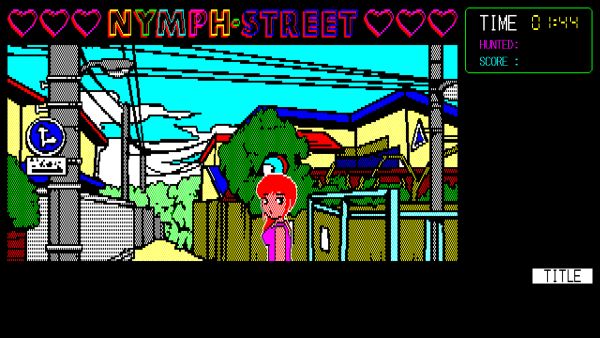
# Do you have any messages for your players?
Sorry for the production taking so long! We plan to release each game-in-game when they have reached a state where they can be played on their own to some extent, so we hope you will continue to follow along.
# Thank you for sharing your thoughts with us!
日本語

# 自己紹介してください。もしよろしければジャーナリストとしての経歴なども説明してください。
同人サークル「qbert」の代表です。本業はフリーライターで、1990年より日本国内のPC・ゲーム情報メディアで記事作成に従事し、現在に至ります。主な歴代取引先メディアに、MSXマガジン、BEEP!メガドライブ、電撃スーパーファミコン、セガサターンマガジン、TECH GIAN(※R18ゲーム専門誌)、ファミ通DC(※ドリームキャスト専門誌)、ファミ通Xbox/Xbox360、週刊ファミ通、ファミ通.com、4Gamerなど。
現在は週刊ファミ通誌の「新作ソフトクロスレビュー」のレビュアーを担当しています。クロスレビュアー歴は、兄弟誌「ファミ通Xbox」で担当していたぶんを含めると、今年で21年目です。

# ゲーム作りを始めたきっかけはなんですか。
日本国内のホビーPCブーム('82~'83年頃)直撃世代ということもあり、10代はBASIC言語で小~中規模なゲームを制作し、当時発行されていたゲームプログラム投稿雑誌に投稿していました(それらは何度か誌面に掲載されました)。
高校卒業後は雑誌ライター業に従事し、しばらくの間ゲーム制作から離れていました。2000年代には、知り合いのつてで、いくつかのガラケー(スマートフォン以前の携帯電話の通称)用のゲーム制作に、ストーリー原案・シナリオで携わりました。作ること自体は楽しかったのですが、スタッフ非公開案件であったことと、人にあれこれ言われながら作業することが性に合わず、仕事として定着するには至りませんでした。
2008年のiPhone登場以降、個人でゲームを作る機運が徐々に盛り上がっていきます。それに乗じて(笑)自分に合った制作環境を求めては、プログラミング言語の習得の難しさに跳ね返され…といった状態が、しばらくの間続きました。
2010年代初頭になると、ビジュアルノベル(ノベルゲーム)の制作に特化した、より習得ハードルの低いゲームエンジンが、いくつか発表されます。その中のひとつであるティラノビルダー(日本のエンジニアが開発したゲーム制作・実行環境「ティラノスクリプト」の機能をGUI感覚で制御できるツール。2013年頃に初期verが発表された)であれば、プログラムが苦手な自分にもマルチプラットフォームのゲームが作れそうだ…と確信したことが、現在に繋がっています。
作りたいジャンルがなぜビジュアルノベルなのかというと、1990年代後半から携わってきたR18ゲーム情報誌の仕事を通じて、数々の素晴らしいビジュアルノベルに触れてきたからです。メジャーシーンのゲームのグラフィックが3D標準になっていく過程を横目で見ながら、「使い古された前時代的なゲームシステムでも、そこに載っている物語や音楽、ビジュアルがすばらしければ、十分プレイする価値のあるゲームになる」と確信していました。……もちろん、「これなら自分でも作れそう」との算段もあってのことですが。

# もしよろしければ、ご本人にとって一番好きなゲームや好きなジャンルをご紹介お願いします。
現在のゲーム制作の基本姿勢に強く影響を受けているのが、『終わる世界とバースデー』という2012年リリースのR18ゲームです。ちょうどオカルト・スピリチュアル界隈で「マヤ暦の終末が…」と盛り上がっていた時期に、アセンション的なテーマを持った本作をプレイしたことで、いろいろと肝が据わりました。後に制作者さんにインタビュー取材したところ、別にアセンションがどうだといったことは考えていなかったそうです(笑)。
最近のゲームでは『グノーシア』、『198X』、『パラダイスキラー』、『Arcade Paradise』といった、メタな視点をゲームシステムに馴染ませたスタイルのインディータイトルに、強く惹かれます。
古くは『信長の野望 全国版』、『コラムス』、『ロードラッシュ』が好きで、延々とプレイしていました。ゲームジャンルはバラバラですが、いずれも「偶然に重なった事象が、一回性の強い”きらめきの瞬間”を作る」という、オープンワールドゲームの前身となるような体験を味わえるものでした。かねてより「『GTA』の直系の祖先は『ロードラッシュ』だ」という主張をしてきたのですが、いまのところあまり賛同を得られていません。

# この度の「Retro Game Aliens」という作品についてご紹介お願いします。
深夜、気がつくと近所を徘徊している症状に悩まされている中年男性が、夜の住宅街で出会った謎の女性に頼まれ、レトロなアドベンチャーゲームをその場でプレイする……という、現代日本を舞台にしたビジュアルノベルです。
主人公は、3タイトルのアドベンチャーゲーム(女性が持っている携帯ゲーム機にインストールされている…という体)を、好きな順番で攻略できます。攻略が進むごとに、幻想的なエピソードが進行。現在と過去の記憶が交錯する、ナラティブな展開を楽しめます。
# それぞれ異なったタイプの3つのゲームをまとめて、一つの「Retro Game Aliens」という作品にした理由について教えてください。
このタイトルに関しては、言葉遊びの意味合いが強いです。日本の有名なレトロゲームのひとつ『平安京エイリアン』のような、複数の単語が居心地悪く並んでいる感じを表現したかった、との思惑があります。最近リリースされたゲームでは『The Cosmic Wheel Sisterhood』に、勝手にシンパシーを感じています。

# 「Retro Game Aliens」を作るときに、どのようなプロセスで作成しましたか。他のゲームを作るときと何か違いがありますか。
まずは、とあるプライベートな体験からメインストーリーの着想を得ました。それをプレイヤー自身の体験に近づけるには、複数のゲームをGame in Gameとして実際にプレイできるようにすることが最適だと思いました。
次に、「複数のゲームのデータをメインストーリーの流れの中で内部的に管理できるのか? 自分の制作環境(ティラノスクリプト)&プログラミングスキルで?」という部分での検討をしました。同時に「この時代(※2018年時)に作るのであれば、多言語対応を念頭においた構造にする必要がある。それもできるのか?」という部分についても検討を重ねました。最初からUnityを使っていれば…とか、プログラミングは他の人に頼めば…といった解決策は制作当初にはなく、とにかく自分ひとりで作るにはどうすればいいかを相当シミュレーションしました。もしも私が完璧主義者だったら、この時点で頓挫していたでしょう。
ビジュアルノベルには、「素晴らしいグラフィックと音楽を、強力な必然性とともに披露できるメディア」との側面もあります。本作を作る際には、それまでのインディーゲーム関連の取材活動などを通して存在を知り、個人的に感銘を受けたアーティストの方々に参加してもらっています。アーティストにたいしては「もっと広く認知されてほしい。『Retro Game Aliens』が、そのきっかけのひとつになれば、いちファンとして幸せ」との思いでいます。

# 「Retro Game Aliens」を作成するにあたり、最も影響を受けたものは何ですか。
タイトルの”エイリアンズ”という単語は、この作品全体で体験してもらいたいムードの象徴でもあります。この世界でたった二人だけが仲間外れにされたようなひとときについての歌(日本国内アーティスト作)のタイトルをそのまま使っている…といえば、日本の皆さんは何となくピンとくるはずです。
# 「Retro Game Aliens」を作成するにあたり最も挑戦したことなどはありますか。
物語世界内にバーチャルなゲームコンソール(携帯ゲーム機)を再現する…というアイデアの実装です。レトロゲームを選択する操作にガジェット感を出せるかが最大のポイントでしたが、現時点では、私がティラノスクリプトで作ったオリジナル版を、パブリッシャーさんがマッチングしてくれたプログラマーさんにUnityで再現してもらう予定なので、最終的にはいい感じに仕上がるはずです。
# 「Retro Game Aliens」において、プレイヤーに伝えたいこだわったポイントなどありますか。
「いつの時代に作られたテレビゲームも、スタートボタンを押した瞬間、プレイヤーはその世界とリアルタイムで繋がれる」ということを押しつけがましくなく伝えることができたら、テレビゲームの歴史に多少なりとも貢献できるのかなと思っています。

# 「Retro Game Aliens」では若いプレイヤーがレトロゲームに触れることから始まりますが、若いプレイヤーへレトロゲームをおすすめする理由を教えてください。
「当時のゲームが最高!」ということを訴えたいわけではなく「提示の仕方によっては、いま遊ぶ価値のあるものになる」と考えています。
若いプレイヤーが昔のゲームに興味を持ちにくいのは、今の自分との関係性が薄いと感じるから。年齢の高いゲームファンが「古き良きゲーム」の魅力をストレートに熱く語るほど、大半の人はますます無関係との確信を強めます。
古いゲームも、ちょっとしたエピソードで挟んだり、現代に慣れ親しんだ形式で提示することで、異なる世代に身近に思ってもらえる━━「今まさに自分に関係あること」として接する動機を与えられるものだなと、2017年に制作・公開したフリーゲーム(※後述)の反響で、偶然発見しました。

# 「ビデオゲーム史を巡る冒険シリーズ」など、発行なさっているZineについて教えてください。
当サークルのコンセプトは「テレビゲームと人の歴史」です。これには、誰かが記録しないと薄れ消えていってしまう、テレビゲーム関連の記憶を自身の興味の範囲で残していきたいとの思いがあります。
その表現方法として、Zineは大きな役割を果たしています。ゲーム制作者、プレイヤーといったさまざまな立場でゲームに携わっている人々の発言や思いを、1冊ごとにテーマを設けて企画・制作しています。
あくまでも個人レベルの活動ということで、テレビゲーム史の一次情報としてはいささか心もとない面があるのはたしかです。しかし、これらをサブテキストとして利用することで、オフィシャルな感じの年表に列挙されている出来事の隙間に何があったのか、想像の翼を羽ばたかせることができるでしょう。

# もし海外のプレイヤーが日本のレトロゲームに挑戦をしたい場合、どのように始めるかおすすめはありますか。
アーケードやファミコン以降のハードのアクションゲームは、すでに世界中で親しまれていると思います。アドベンチャーゲームに関しては言語の壁が大きく、現在エミュレータ同梱で提供されている当時のオリジナル版をそのままおすすめするわけにもいきません。
となるとやはり、当時のゲームの空気感を再現しつつ、多言語対応の作りの『Retro Game Aliens』をプレイしていただくのがよいでしょう!(露骨なセルフアピール
# レトロゲームにはあって、現代のゲームにはない魅力などがあれば教えてください。
いまでこそマルチプラットフォーム展開は普通にあることですが、レトロゲームの時代(~1990年代前半)は、同一タイトルでも、対応コンソールによってプレイ体験が微妙に、あるいは派手に異なるのが特徴でした。それぞれの出来次第で誇らしげになったり、逆に意固地になったり、いちユーザーとしてもさまざまな感情を味わえました。
# おすすめのインディーゲームはありますか。おすすめのポイントも教えてください。
古いゲームですが、『Expand』は「インディーゲームってこういうのもありなんだ」と最初に驚かされたゲームでした。大手メーカーが絶対作らないであろう、静かな世界が魅力です。
近年のおすすめは…すでに他の質問で、傾向や具体的なタイトルを挙げています。

# もしよろしければ、これ以外に作成したゲームについてご紹介お願いします。
父親のPCの中身を調べたら謎のゲームソフトを発見し……というシチュエーションを描いたフリーゲーム『お父さんのPCクエスト』が、現在のゲーム制作活動に直結している作品です。日本国内でネットミーム的存在になった、1990年代製のフリーゲームのパロディ要素もあり、10~30代に受け容れられたようです(人気配信者のゲーム実況動画経由でですが…
# 今はどのようなプロジェクトを進めていますか。今作っているゲームなどをもしよろしければご紹介お願いします。
『Retro Game Aliens』と並行して、R18のアドベンチャーゲームを制作中です。こちらは2000年以前のR18ゲームの「セクシャル描写を方便にメチャクチャやっている感」をストレートに再現したい、との狙いがあります。

# プレイヤーの皆さんへ何かメッセージがあれば一言お願いします。
制作期間が長引いていて申し訳ありません!各Game in Gameは、単体である程度プレイできる状態で随時公開していく予定ですので、引き続き気にかけていただければ幸いです。
# この度はインタビューにご協力いただき誠にありがとうございます。

